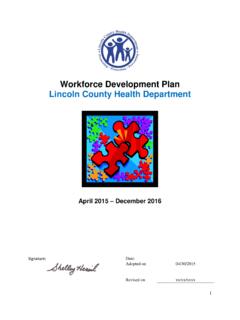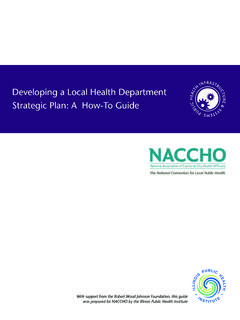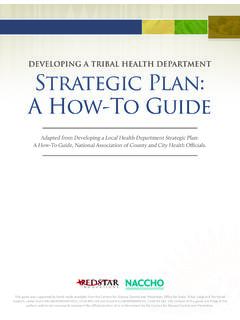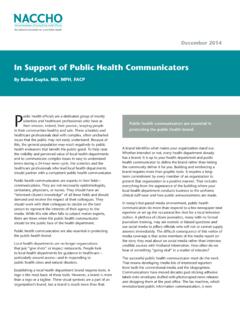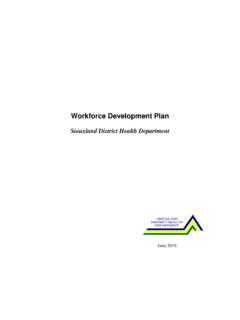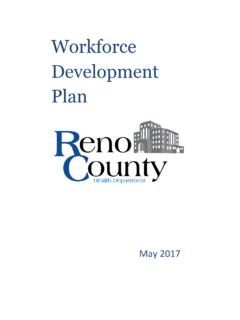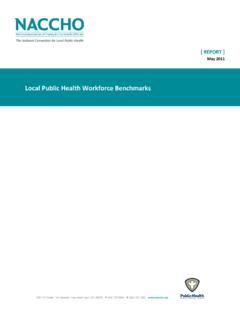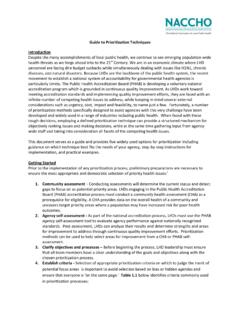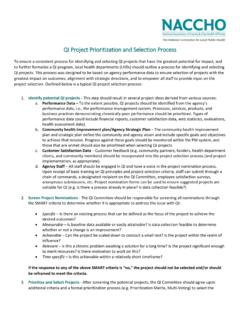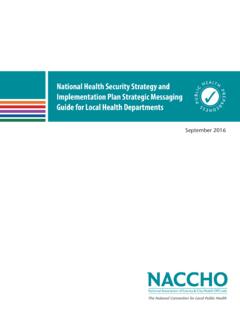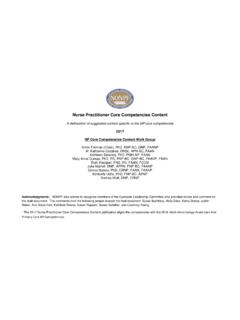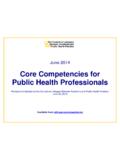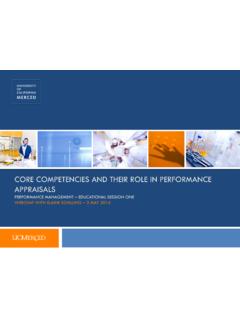Transcription of MRC Core Competencies - NACCHO
1 MRC core Competencies Developing Volunteer The Competencies are aligned into four MRC. Learning Paths: Volunteer Preparedness, Capabilities and Baseline Volunteer Response, Volunteer Leadership, and Training Standards Volunteer Support for Community Resiliency. Providing a solid training foundation is essential MRC Volunteer core Competencies in building volunteer capabilities and ensuring they are ready for potential deployments. The MRC core Competencies serve as the national Preparedness training standard for MRC volunteers and provide Personal & Family a common language to communicate volunteer Safe Behaviors capabilities with other MRC units and partner Response organizations. Volunteer Roles Communicate Effectively In addition, NACCHO has developed two Surge Capacity Responses eLearning modules for MRC volunteers to provide Clinical Management them with resources and tools to outline steps LEARNING PATHS.
2 They can take to prepare for deployments and Leadership identify what to expect during and after a Situational Awarenesss deployment. Public Health for All Populations Community Resilience MRC core Competencies Overview Ethical Principles The Medical Reserve Corps (MRC) core Legal Principles Competencies were originally developed in Recovery Considerations 2006 to provide a set of skills and knowledge for MRC volunteers to be able to perform their volunteer responsibilities. In 2014, the MRC core An MRC core Competencies training plan is Competencies were updated to align with the 11 available for MRC unit leaders and volunteers to Disaster Medicine and Public Health (DMPH) assist them in meeting the training requirements core Competencies , which serve as the core of the Competencies . This training plan provides Competencies for public health professionals. courses that are available through the MRC.
3 TRAIN platform and provides flexibility for MRC. These Competencies represent a baseline volunteers to take courses at their own pace. level of knowledge and skills that all MRC MRC units may also provide in-person courses volunteers should have, regardless of their role or develop their own training plan to meet the within the MRC unit. Each competency should be Competencies . understood at a basic level, with the recognition that more information and skill can be gained in The MRC performance qualifications translate each competency with additional training and the core Competencies into measurable actions experience. that are relevant to the work of MRC volunteers. MRC Deployment Readiness Guide [15]. MRC core Competencies Like the core Competencies , each of these performance qualifications can be met at a basic or advanced level. MRC volunteers will have varying levels of training, experience, and ability to deploy.
4 The 2019 MRC core Competencies Training Plan includes recommendations for the appropriate volunteer tier level for each of the Deployment trainings. Using the recommended tier Ready levels will help the MRC unit leader identify core competency training priorities to build volunteer capability across the unit to meet the local response needs. It also provides a structure for volunteers seeking additional training or levels of responsibility. MRC Volunteer Deployment Readiness eLearnings NACCHO , with input from the contributors of the Deployment Ready project, has developed two eLearning trainings for MRC volunteers to prepare them for the different phases of deployments. The Pre-Deployment training provides volunteers with an understanding of the phases of deployment, terms and acronyms used, personal and family preparedness, trainings, and other activities they can take to be prepared in advance for potential emergency responses, as well as planned non- emergency events.
5 The Deployment and Post-Deployment training provides volunteers with understanding of the types of activities they can expect during and after a deployment. It also provides information on health and safety factors, equipment, supplies, training, administrative and operational activities. The MRC Volunteer Deployment Readiness trainings are available on: MRC TRAIN ( ). MRC Volunteer Deployment Readiness: Pre-Deployment Course #1086867. MRC Volunteer Deployment Readiness: Deployment and Post-Deployment Course #1086868. NACCHO University ( ). Both courses can be found in the Public Health Preparedness tab - Medical Reserve Corps. MRC Deployment Readiness Guide [16]. MRC core Competencies MRC core Competencies by Learning Path Organized into four Learning Paths, the core Competencies for Disaster Medicine and Public Health (DMPH) represent a baseline level of knowledge and skills that all MRC volunteers should have, regardless of their role within the MRC unit.
6 Because the DMPH Competencies establish only a minimum standard, units may choose to expand on the Competencies in order to train volunteers at a more advanced level. MRC core Competencies Learning Paths MRC Deployment Readiness Guide [17]. MRC core Competencies MRC core Competencies Training Plan (as of August 2019). The Medical Reserve Corps (MRC) Training Plan is a suggested guide for training MRC volunteers at the local level. It presents a menu of options to guide MRC unit leaders and volunteers with trainings that align with the DMPH Competencies . MRC units can choose trainings from the training matrix, use other trainings not listed in the matrix, or create their own unit-specific trainings based on the DMPH. Competencies . How to Use the MRC Volunteer Training Matrix The MRC core Competencies Training Plan is organized using the following categories: Learning paths are groups of Competencies related to certain topics that align with volunteer motivations.
7 The four learning paths are Volunteer Response, Volunteer Preparedness, Volunteer Leadership, and Volunteer Support for Community Resiliency. Disaster Medicine and Public Health (DMPH) Competencies serve as the foundational competency set for MRC volunteers and represent a baseline level of knowledge and skills that all MRC volunteers should have, regardless of their role within the MRC unit. MRC performance qualifications break down the DMPH Competencies into measurable, MRC- specific qualities ( , knowledge, skills, and attitudes) and actions that a volunteer should have or be able to perform in order to be considered competent in an area. Suggested trainings/tools are recommended resources and trainings, most of which are available online and free of cost, that will enable volunteers to meet the Competencies . The training list is not comprehensive; rather, it is a starting point for unit leaders to consider.
8 The trainings are accessible through MRC-TRAIN. (*The DMPH Competencies have an associated training series that are eligible for CME or CNE credit. These courses are denoted with an asterisk in the matrix.). Time is the estimated length of time required to complete the training. Volunteer tier level applies to the level of training (introductory, intermediate, or advanced) and the appropriate volunteer tier level. Tier Level 1: Advanced level of knowledge for volunteers serving in a specialized or supervisory response role Tier Level 2: Intermediate level of knowledge for volunteers wishing to expand their skills and abilities Tier Level 3: Introductory level of knowledge that all volunteers should have Tier Level 4: Volunteers who have registered but have not completed MRC orientation Unassigned: New volunteers who have not completed registration or orientation MRC Deployment Readiness Guide [18].
9 MRC core Competencies Accessing and Registering for Courses on MRC-TRAIN. MRC-TRAIN is an online training platform that allows MRC unit leaders and volunteers to access, register, and share MRC-related, public health, and emergency preparedness courses. Use the following instructions to access MRC-TRAIN and the course recommendations listed below: 1. Login to MRC-TRAIN at 2. Search for courses by Keyword or Course ID #. 3. To register for a course, click on the course title and then click the +Register tab. Next, select your credit (if applicable) and click Launch. The course will open in a new window. 4. The National MRC Training Plan can be found at MRC core Competencies Training Plan Learning Path: Volunteer Preparedness MRC. DMPH Suggested Trainings and Volunteer Performance Time Competency MRC TRAIN Course Number Tier Level Qualifications Personal and Family Preparedness* - 25.
10 Demonstrate Level 3. MRC-TRAIN 1081145 minutes personal and family Complete a Personal Preparedness for Public Health 1-2. preparedness Level 3. personal and family Workers (RIDOH) - MRC-TRAIN 1060420 hours for disasters and preparedness plan. public health emergencies. Animal Emergency Preparedness - 1. Level 2. MRC-TRAIN 1025307 hour 40. Personal Safety* - MRC-TRAIN 1081353 Level 3. minutes Responder Health and Safety (Basics of 25. Public Health Preparedness, Module 5) - Level 3. minutes MRC-TRAIN 1046400. Demonstrate knowledge of Workforce Resiliency 2: Individual and personal safety Demonstrate safe Organizational Preparedness - Level 3. hours measures that can behaviors during MRC-TRAIN 1021348. be implemented in MRC activities. a disaster or public Personal Safety and Health for Emergency 1. Level 3. health emergency. Responders - MRC-TRAIN 1064120 hour HAZMAT for Healthcare Providers: Self- Level 2.
